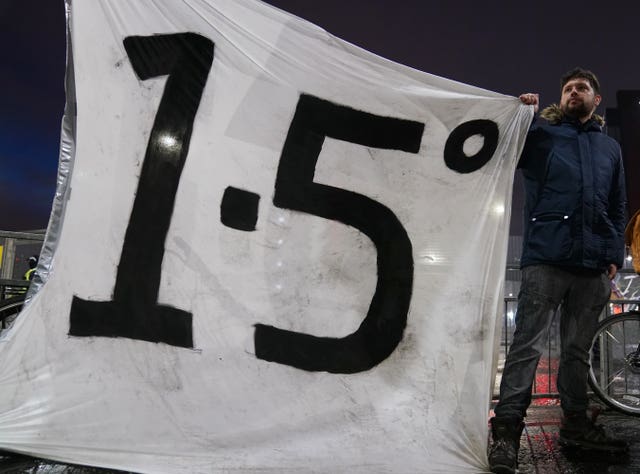
Calls on countries to accelerate the phase out of “unabated coal and “inefficient fossil fuel subsidies” has survived into a new version of the deal for overrunning Cop26 talks.
The latest draft, published more than 13 hours after the UN climate summit in Glasgow was due to have finished, also requests countries “revisit and strengthen” their 2030 emissions-cutting targets by the end of 2022.
This is seen as key to keeping the goal of limiting global warming to 1.5C, beyond which the worst impacts of extreme weather and rising seas will be felt, within reach, although it does not specifically refer to the 1.5C goal.
READ MORE: Carbon footprint in Glasgow expected to be twice as much as last summit
It requests countries revisit the targets “as necessary to align with the Paris Agreement temperature goal by the end of 2022, taking into account different national circumstances”.
In the Paris Agreement in 2015, countries committed to limit temperature rises to “well below” 2C and try to limit them to 1.5C to avoid the most dangerous impacts of storms, droughts, crop failures, floods and disease.
Scientists have warned that keeping temperature rises to 1.5C requires global emissions to be cut by 45% by 2030, and to zero overall by mid-century.
 Climate activists protesting (Andrew Milligan/PA)
Climate activists protesting (Andrew Milligan/PA)
But despite countries being required to update their action plans, known as nationally determined contributions, for emissions cuts up to 2030 in the run-up to Glasgow, the latest pledges leave the world well off track to meet the goal.
Therefore, countries are under pressure to come up with a deal in Glasgow that will see them rapidly increase their ambition for emission cuts in the 2020s to stop the 1.5C goal slipping out of reach as well provide the finance for developing countries to cope with the crisis.
It also urges developed countries to at least double their collective provision of climate finance to help developing nations adapt to climate change, from 2019 levels by 2025.
READ MORE: Huge crowds of protesters take to Glasgow streets to call for climate action
The historic reference to coal and fossil fuel subsidies has survived into the latest draft of the “cover decision” text for an overarching deal that countries are hoping to strike in Glasgow, despite expected pushback from some big producer and emitter nations.
It is the first time a climate change agreement of this kind specifically mentions coal or fossil fuels.
It calls on countries to accelerate technology and policies to shift towards low emission energy systems, by scaling up clean power generation and energy efficiency, including accelerating efforts towards the phase-out of unabated coal power and inefficient fossil fuel subsidies.
But it also recognises the need for support towards a “just transition”, seen as important to protect those who might be hit by job losses or higher costs from the shift to clean energy.



Why are you making commenting on The Herald only available to subscribers?
It should have been a safe space for informed debate, somewhere for readers to discuss issues around the biggest stories of the day, but all too often the below the line comments on most websites have become bogged down by off-topic discussions and abuse.
heraldscotland.com is tackling this problem by allowing only subscribers to comment.
We are doing this to improve the experience for our loyal readers and we believe it will reduce the ability of trolls and troublemakers, who occasionally find their way onto our site, to abuse our journalists and readers. We also hope it will help the comments section fulfil its promise as a part of Scotland's conversation with itself.
We are lucky at The Herald. We are read by an informed, educated readership who can add their knowledge and insights to our stories.
That is invaluable.
We are making the subscriber-only change to support our valued readers, who tell us they don't want the site cluttered up with irrelevant comments, untruths and abuse.
In the past, the journalist’s job was to collect and distribute information to the audience. Technology means that readers can shape a discussion. We look forward to hearing from you on heraldscotland.com
Comments & Moderation
Readers’ comments: You are personally liable for the content of any comments you upload to this website, so please act responsibly. We do not pre-moderate or monitor readers’ comments appearing on our websites, but we do post-moderate in response to complaints we receive or otherwise when a potential problem comes to our attention. You can make a complaint by using the ‘report this post’ link . We may then apply our discretion under the user terms to amend or delete comments.
Post moderation is undertaken full-time 9am-6pm on weekdays, and on a part-time basis outwith those hours.
Read the rules hereLast Updated:
Report this comment Cancel